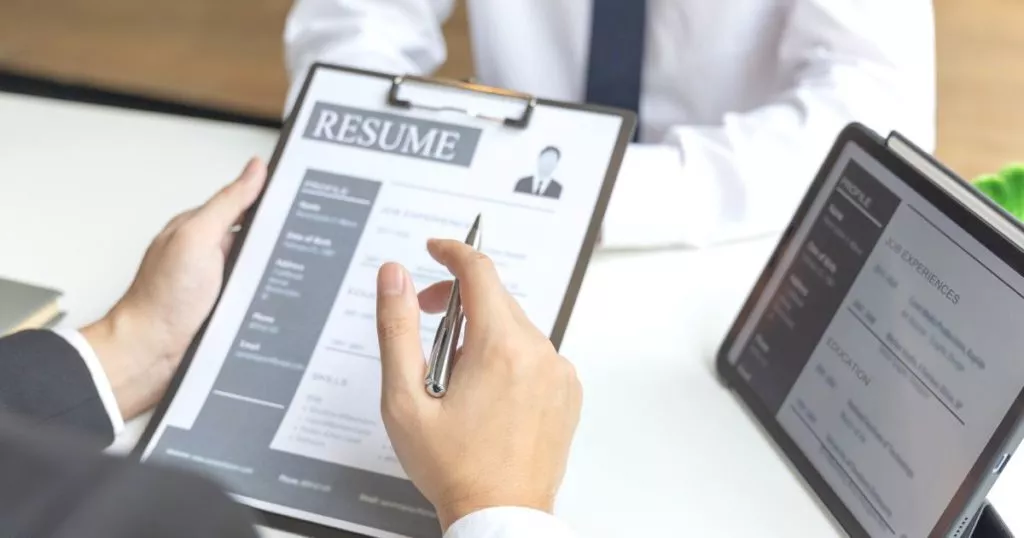After applying to numerous companies and undergoing interviews, an average applicant may need to wait 20 to 40 days before getting a job offer. Note that the waiting time can be faster or slower depending on a person's circumstances. Given how anxiety-inducing this period is, the experience is never easy.
Identifying the signs that you will likely get the job after the interview can be helpful for your mental health. Knowing that an interview went well gives applicants the validation they need to be more patient.
20 Signs you will get the job after interview
Besides a boost in self-confidence, knowing the signs you will get the job after the interview makes one a more competitive applicant. These details teach applicants how to act before recruiters and ace their next job interview. Gain an edge against other job seekers after you dig deeper into these promising signs:
1. The interview lasts longer than the usual
A more extended and substantive interview is a great sign you got the job. In contrast, a short interview is a bad sign. A long conversation is a promising sign because most hiring managers spend more time with potential hires to gauge their compatibility with the company and the open position.
Pro Tip:
Average job interviews last from 45 minutes to an hour. While this target seems too long, a simple way to extend the interview without making the conversation boring or forced is by asking questions. Raise inquiries relevant to the interview and insert details highlighting your personal strengths and professional assets.
2. The interviewer engages in a casual conversation with you
Contrary to what others think, the best interviews should not feel like actual interviews. The stiffer the parties are, the more likely the discussions will be unnatural and uncomfortable. In contrast, when your interview turns into a casual conversation, it is a very good sign that you got the job.
Pro Tip:
Casual conversation interviews often start with icebreakers. For example, start with friendly gestures to show your genuine interest in the job. As the interview progresses, introduce personal details so the interviewer can feel more connected with you. Do not hesitate to ask follow-up questions to make the interview more progressive.
3. The interviewer remembers your name and mentions it several times
One of the most subtle signs you will get the job after interview is when the hiring manager repeatedly mentions your name. Hiring managers should address applicants appropriately during the recruitment process, but consistently mentioning somebody's name is an unconscious expression of interest.
Pro Tip:
Applicants can do a few things to make hiring managers remember their names. For example, during self-introductions, applicants should speak clearly and be confident. Another trick is asking hiring managers to call them by a specific nickname. Designating a nickname may help make the conversation more personal.
4. The interviewer shows you around the office and introduces you to potential colleagues
A job interview is an interactive experience, but often, it does not include an office tour. The hiring manager does not have to undergo the unnecessary stress of showing an applicant around and introducing them to other team members. It may be their attempt to convince an excellent applicant to approve a job offer should the company make one for them.
Pro Tip:
It is not common practice for applicants to request an office tour, but when you want to ask for one, do so politely. If the hiring manager offers an office tour, be attentive to every detail and respond appropriately.
5. The "interview smiles," nods, and other positive body languages
Interviewers try to stay neutral during interviews, so it takes keen observation to identify their body language. Two of the most notable positive signs include attentive nodding and smiling. These gestures often mean that the hiring manager can picture an applicant fitting into the position and the company culture.
Pro Tip:
Smiling and nodding can indicate approval and amazement. Triggering these feelings from a hiring manager is difficult, but being sincere and organized are the most reliable ways to do so. Always stay true to what you say but try to deliver streamlined and easily understandable information.

6. The interviewer tells you about the future plans of the company
One of the good signs you will get the job after an interview is when the interviewer brings up upcoming plans. It can be the hiring manager's attempt to convince the applicant to stay interested in a job offer. It also shows how an applicant's career path will grow.
Pro Tip:
It is up to the interviewer whether they will discuss company plans. When they do, listen attentively and ask relevant questions. Most importantly, maintain tact and respect all the time.
7. The interviewer gives you a specific time frame
Waiting for a response after submitting an online application takes undetermined time. In comparison, the waiting time after the interview is more specific. When a hiring manager eyes an applicant for the open position, they will be more specific and refrain from saying things like "you will hear from us in a few weeks."
Pro Tip:
Acknowledge the hiring manager's remark specifying when they will get back to you after the interview. Doing so will signify your gratitude for and interest in the job opening. Should there be any conflict involving the given time frame, always inform the hiring manager ahead of time to allow adjustments.
8. The interviewer gives you his card or contact information
Receiving a calling card or contact information is a great sign that an applicant did well during the interview. Interviewers are selective with whom they want to interact more, so they do not hand out their contact information easily.
Pro Tip:
Be careful when to call for a job application follow-up. Recruiters may hand over their calling cards, but it is not an open invitation to contact them at any moment. Be considerate of their schedule and only call them during office hours.
9. The interviewer validates the value you bring to the company
Another good sign that an applicant is likely successful in an interview is when the interviewer validates their potential as a future employee. Applicants can say anything during the interview, and it will be up to the interviewer to believe them. Highly interested recruiters will point out applicants' impressive features to encourage active participation during the hiring process.
Pro Tip:
Applicants who receive commendations from interviewers should express gratitude and humility. Knowing one's worth and strengths is a good sign, but never forget about humility. Besides skills, experience, and potential, recruiters look for grounded candidates who will remain humble and dedicated regardless of the successes they will achieve.
10. The interviewer asks about your level of interest in the company
Hiring managers ask about applicants' intention to work in the company because it assesses if they are the right person for the open position. However, when hiring managers press further and ask for an applicant's level of interest in the post, it could be a good sign that the applicant is a top contender.
Pro Tip:
Applicants should be cautious when responding to the query about one's level of interest in a job post. Besides expressing one's exact level of interest, one should also provide sound reasons for such a choice. After, explain how you can make a difference to the company through personal assets and other experiences.

11. The interviewer shares details of the follow-up process
Many interviewers refrain from divulging too much information regarding the upcoming interview phases to avoid leading on applicants. Thus, it is not a bad sign when the interviewer expressly or subtly shares details of what is coming next. Most of the time, it is an attempt on the recruiter's part to gain the interviewers' interest within a specific period.
Pro Tip:
When the interviewer opens up about the next steps, learn as much as possible by asking questions regarding the rest of the interview process and potential requirements. Your eagerness to learn indicates that you want the job and are least likely to bail out of the application process.
12. The interviewer talks about company perks and benefits
One of the most promising signs to spot during an interview is when the recruiter discusses benefits that successful hires can acquire. When the hiring manager keeps mentioning what perks the applicant could enjoy, the applicant is likely an excellent candidate.
Pro Tip:
Discussing compensation benefits and other perks is a sensitive topic. Applicants should refrain from dwelling on this topic, especially during the initial interview. Being too vocal about desired benefits can make one look arrogant and demanding.
13. The interviewer sells you on their company
Statistics show that interviewers can determine the quality of a job candidate within the first five to fifteen minutes of the interview. Upon seeing people with potential, they try to recruit them with the best that the company can offer. Besides perks and benefits, interviewers try to tout outstanding applicants into the job by discussing salary expectations, growth opportunities, and work culture.
Pro Tip:
Similar to perks and benefits, avoid being demanding and arrogant. There are no restrictions against applicants making demands and ensuring they receive reasonable compensation, but companies irk at the sight of arrogance and irrationality. Studies show that 70% of employers consider an applicant's personality a major deal breaker during interviews.
14. The interviewer encourages you to join as soon as possible
Interviewers follow a strict schedule when recruiting employees, but sometimes they skip some steps to prioritize hiring specific posts. Especially when an open position is marked as "urgent," it is a good indication when the interviewer asks when is the soonest time the applicant can start working.
Pro Tip:
When the interviewer wants you to work with the company soon, respond honestly. Disclose whether you have other priorities to settle before taking the job offer because complications may arise if this matter is unresolved. Also, do not forget to give yourself ample time to prepare and adjust.
15. The interviewer invites you for a second interview
Having a chance at the next interview is an obvious sign that an applicant did well enough in a previous interview. Moving on to the next stage means one possesses the qualifications for an open position. It is an opportunity that applicants should take full advantage of because the next level of interrogations could be stricter.
Pro Tip:
Never be complacent after being invited to a second interview. At this stage, be more confident and answer questions with better accuracy. However, it does not mean you can change your answers to the same questions asked beforehand. Consistency is still crucial, so always be keen with your responses.

16. The interviewer shakes hands with you after the interview
Shaking hands with the interviewer could be one of the signs you got the job, but it is less indicative than the others. Many interviewers shake the hands of applicants as a sign of professionalism and civility. It could also be a gesture signifying a successful discussion with a respectable person.
Pro Tip:
Always aim to shake interviewers' hands before and after the interview. Applicants can turn a good interview into a better one by showing good manners and proper conduct to the interviewer. This simple and underrated gesture helps parties be more comfortable with one another.
17. The interviewer talks you through the transition steps
Onboarding refers to the introduction of new hires to a company's work culture, organizational flow, and other crucial factors that may affect their work experience. It is a transitional step that happens only after hiring. When an interviewer guides an applicant on how they may transition into the company, it is among the top signs that they are likely to be hired.
Pro Tip:
Every company has unique transition steps that new hires go through. If you have questions regarding what the interviewer is talking about, do not hesitate to raise queries. It is better to clarify matters beforehand than to experience complications later.
18. The interviewer asks you about salary expectations
Salary discussion is another matter that applicants should tread lightly. It is ideal to wait for the interviewer to open this topic before saying anything related. Notably, interviewers asking about one's salary requirements is one of the good signs you got the job.
Pro Tip:
Refrain from being too rigid during salary negotiations. It is reasonable to set expectations on how much you want to earn but provide room for adjustment. You have to realize that not all companies may meet your exact expectations, but they can offer something that is not too astray from what you initially wanted.
19. The interviewer asks when you can start
Interviewers ask for the applicants' potential starting date to assess whether they can be in the position within a specified schedule. When interviewers ask this, they also want the applicant to leave other responsibilities to be with the company. Interviewers must ensure that the candidate they are eyeing does not develop any conflict of interest.
Pro Tip:
Before applying for a new job, be sure to clear out your schedules. If ever still transitioning out of a previous position, it is best to be clear with the interviewer. Calculate time for possible delays to avoid inconsistencies and waste time.
20. The interviewer responds quickly to your follow-up email
Besides recruitment, the human resource department is also busy with other tasks. If they respond immediately and positively to your follow-up email, there is a good chance you did well in the interview.
Pro Tip:
Observe proper etiquette when sending follow-up emails. Be respectful and avoid pressuring the company to decide on your application swiftly. When you receive their response, reply with enthusiasm and gratitude.

Communication courses to help you win job interviews
Communication skills are underrated but integral to any job interview. This set of soft skills enables applicants to express themselves professionally and convey thoughts that would impress even the strictest hiring manager. Nowadays, one of the fastest ways to develop first-rate communication skills is through online courses. Here are our must-take courses:
Effective Interviewing Skills
Effective interviewing applies to many fields, such as investigation and support services. But beyond these practical purposes, this skill is most relevant when finding job opportunities. Effective Interviewing Skills is an online course perfect for people interested in building their interviewing skills and maximizing the benefits that come along with it.
This one-hour and 23-minute course is learnable by everyone, even those who have yet to gain prior training or experience with effective interviewing. It is a compact resource discussing the forms of interviews, best field practices, and how professionals can grow their potential as first-rate communicators.
Take this courseCommunicate Effectively To Impress Others And Achieve Results
There are many things to prepare to succeed in life; one is becoming a proficient communicator. Communication skills are essential because they support network-building and other professional endeavors. Communicate Effectively To Impress Others And Achieve Results is a short online course that explores the secrets of effective communication and teaches learners how to make impactful messages.
Besides speaking and writing, effective communication can also happen through positive body language and active listening. This course includes result-oriented tips that can make anybody a more developed communicator, especially during a job search. In addition, the illustrative and easy-to-follow examples make it easier for learners to follow through each chapter and apply the lessons in real life.
Take this courseThe Complete Job Interviewing Skills Masterclass
Career hacking may sound illegal, but it is an efficient way to raise one's chances of getting a job after an interview. It is about utilizing whatever means available to be better at job interviews, get job offers, and establish a successful career. The Complete Job Interviewing Skills Masterclass is a digital course that breaks down how career hacking works, primarily through drafting CVs and performing well during interviews.
This expert-made course does not require learners to have prior knowledge before taking it. In less than 5 hours, learners can become masters at job search, interview etiquette, and interacting professionally with hiring managers.
Take this courseWhen should you follow up after a job interview?
Many recruiters inform applicants when to expect their call after the interview. If the recruiters do not make the call after the specified period lapses, applicants should take the initiative to reach out. If the recruiters did not mention any date, industry leaders suggest calling one to two weeks after the interview.
One to two weeks is a reasonable grace period because the hiring process involves too many steps unseen by applicants. Asking at an earlier date can create an impression of impatience. Applicants should carry themselves with grace and professionalism to increase one's chances of hiring.
A positive sign manifests only after impressing the hiring manager
Before knowing the signs you will get the job after the interview, focus on developing soft skills first. These non-technical skills will help applicants improve their chances of connecting with hiring managers and earning the company's trust. Besides, being proficient in soft skills informs hiring managers that a specific candidate is easy to work with and adjustable to a wide array of company cultures.


